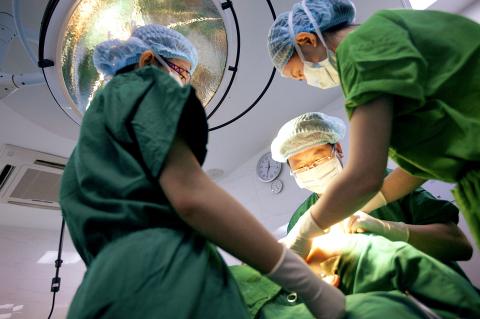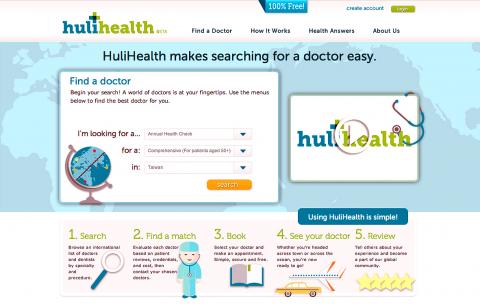New Web startup Hulihealth (www.hulihealth.com) aims to create a comprehensive database of the best doctors in the world.
Now in its beta stage, the Web site lists doctors in Taiwan vetted by Hulihealth for the quality of their care and ability to treat foreign patients. Hulihealth’s section for this country, which went live less than three weeks ago, currently features two Taipei City clinics that offer annual health checkups, Eonway Health Maintenance Center (永越健康管理中心) and Lianan Wellness Center (聯安診所). It will add dentists, optometrists and cosmetic surgeons soon.
“We consider ourselves more than just a medical tourism company,” says founder Alejandro Vega. “We are about connecting patients and doctors no matter where they are.”

Photo: Bloomberg
Hulihealth’s pilot program also includes Panama and Costa Rica. Vega says the company’s goal is to eventually list the top 10 percent of doctors and dentists in every country on its site.
Its target base is not just medical tourists, but also expats and locals. The site will be available in Chinese at the end of this month.
In Taiwan, Hulihealth taps into a rapidly growing industry. Richard Wu (吳明彥), the chief executive officer of the Taiwan Task Force for Medical Travel (台灣醫療服務國際化專案), estimates that annual revenue from medical travelers treated at the 32 hospitals tracked by the task force has increased by 30 percent each year since 2008, earning a total of US$100 million in 2010.

Photo Courtesy of Hulihealth
But Taiwan’s medical industry still needs to cultivate its international reputation, says Wu. The task force is partnering with Hulihealth as part of its promotional efforts.
“It takes time to build up trust with patients and doctors,” says Wu. “Compared to Singapore and Thailand, which have already built up their country’s brands, Taiwan still faces that challenge.”
Hulihealth markets itself to hospitals and clinics as a way to reach a new clientele.
“It gives us a platform to promote our services,” says Sherry Shih (施白), the deputy executive director of Eonway. “Before, patients usually found us through word of mouth or online searches.”
For users, Hulihealth provides a comprehensive overview of a doctor’s credentials and a free and easy way to book appointments online. It makes money by taking a commission from doctors, who are not allowed to charge Hulihealth users more than other patients, for each appointment booked.
One of the Web site’s first patients in Taiwan, Kathie (who requested that her last name not be published for privacy reasons), says Hulihealth caught her eye because it reminded her of using Opentable.com to book restaurant reservations while living in New York City.
Kathie, a consultant who moved to Taiwan 18 months ago, had gone for a checkup at Taiwan Adventist Hospital (台安醫院) based on recommendations she saw on an Internet forum, but found the experience frustrating.
“Given how it was ranked in terms of being an expat-friendly hospital, I actually didn’t find it very expat friendly,” says Kathie. “It was taking a number and waiting in line for a really long time, and when I finally saw a doctor it was for under five minutes.”
In contrast, booking an annual health checkup on Hulihealth was “painless and simple.” Kathie also found the ability to leave feedback reassuring.
“In general, there is a good overall description [of clinics] and I see it as a curated selection,” says Kathie. “I’m like, OK, they are not going to put something on there that I am going to hate.”
Vega came up with the idea for Hulihealth after meeting medical tourists on a flight from Costa Rica to the US.
“More than the travel itself, I was intrigued by the problem of finding the doctors providing the best fit for them locally or abroad,” says Vega. “Some countries don’t have the right technology or expertise. Some have it or they are very expensive and have very long waiting lines.”
Hulihealth’s eight-member team plans to gradually add doctors, handpicking them based on advice from medical leaders and organizations in each country. In Taiwan, Hulihealth chief operating officer David Chao (趙令偉) has been working with the Taiwan Task Force for Medical Travel, which is organized by the Department of Health, to find doctors and create an advisory board that will guide Hulihealth as it expands its services in this country.
Chao has visited 10 hospitals across Taiwan, in addition to specialty clinics. The purpose of the visits is two-fold: to pitch Hulihealth to doctors and assess their ability to treat foreigners.
“Basically for me, the question is, at the end of the day, would I go there myself?” says Chao, who was raised in England. “Would I recommend that somebody in my family go there?”
Hulihealth’s competitors include medical travel Web sites like PlacidWay and Patients Without Borders. Many operate like travel agencies by offering packages that include doctor appointments, flights and hotel rooms.
Vega says that Hulihealth will differentiate itself by offering greater transparency and allowing patients to pick and evaluate their doctors.
After patients complete an appointment, they are invited to leave feedback under their real name or a pseudonym (the Web site will operate in compliance with privacy laws as set forth under the US’ Health Insurance Portability and Accountability Act (HIPAA)).
Aside from providing customer service to handle patient concerns or questions, Hulihealth takes a hands-off approach; Vega says the Web site will not offer doctor or hospital recommendations.
“It is first Hulihealth’s vetting process and then trying to build a community within the Web site where patients themselves can provide feedback about doctors,” says Vega.

On April 26, The Lancet published a letter from two doctors at Taichung-based China Medical University Hospital (CMUH) warning that “Taiwan’s Health Care System is on the Brink of Collapse.” The authors said that “Years of policy inaction and mismanagement of resources have led to the National Health Insurance system operating under unsustainable conditions.” The pushback was immediate. Errors in the paper were quickly identified and publicized, to discredit the authors (the hospital apologized). CNA reported that CMUH said the letter described Taiwan in 2021 as having 62 nurses per 10,000 people, when the correct number was 78 nurses per 10,000

As we live longer, our risk of cognitive impairment is increasing. How can we delay the onset of symptoms? Do we have to give up every indulgence or can small changes make a difference? We asked neurologists for tips on how to keep our brains healthy for life. TAKE CARE OF YOUR HEALTH “All of the sensible things that apply to bodily health apply to brain health,” says Suzanne O’Sullivan, a consultant in neurology at the National Hospital for Neurology and Neurosurgery in London, and the author of The Age of Diagnosis. “When you’re 20, you can get away with absolute

May 5 to May 11 What started out as friction between Taiwanese students at Taichung First High School and a Japanese head cook escalated dramatically over the first two weeks of May 1927. It began on April 30 when the cook’s wife knew that lotus starch used in that night’s dinner had rat feces in it, but failed to inform staff until the meal was already prepared. The students believed that her silence was intentional, and filed a complaint. The school’s Japanese administrators sided with the cook’s family, dismissing the students as troublemakers and clamping down on their freedoms — with

As Donald Trump’s executive order in March led to the shuttering of Voice of America (VOA) — the global broadcaster whose roots date back to the fight against Nazi propaganda — he quickly attracted support from figures not used to aligning themselves with any US administration. Trump had ordered the US Agency for Global Media, the federal agency that funds VOA and other groups promoting independent journalism overseas, to be “eliminated to the maximum extent consistent with applicable law.” The decision suddenly halted programming in 49 languages to more than 425 million people. In Moscow, Margarita Simonyan, the hardline editor-in-chief of the